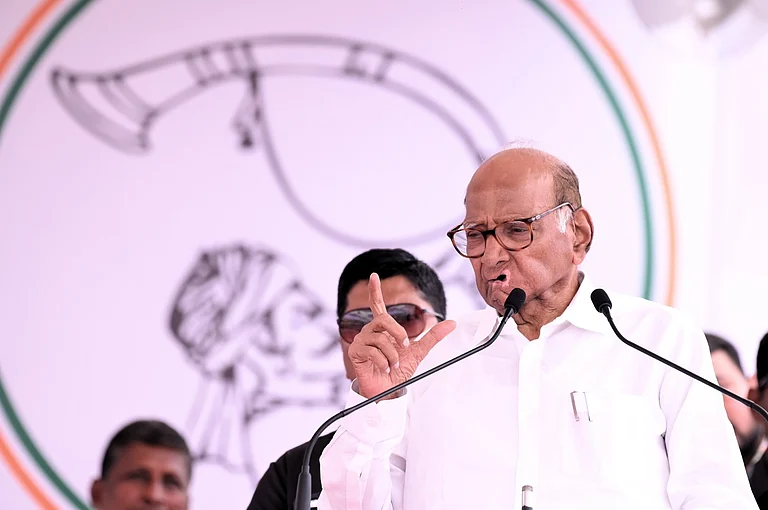EVEN when I stretch my rational thinking limit to its maximum, I find no rationality in the way the centres of knowledge workers, the large international investment banks and mutual funds, work. They seem to be frozen in thoughts handed down to them by their ancestors. And ambushed by inertia. And the problem is that their incompetence today matters for India. It has mattered since 1992, when their money opportunity suction pads reached the country, where they've been baptised as foreign institutional investors (FIIs).
You don't have to be a genius to figure out the following: if fund managers do their jobs well enough, the return on every dollar invested should be as high as possible in the safest possible way. It also means that if the return on the dollar has to fall, that fall should be as small as possible. It is in this context that the investment behaviour of the FIIs is unnerving, and the touching faith of many Indian analysts in FIIs disgusting.
Here are the numbers generated by some research I did recently. I looked at 105 stockmarket indices across the world, compared their performance across four points: last month, last year, last three years and last five years. What triggered off this research was the sudden dip in the Russian rouble by more than half, leading to a 49 per cent fall in the CSFB Russian Stock Index to 568.3, which pushed down the Venezuela General Index by 33 per cent to 2,905.9, Japan's Nikkei Average by 22 per cent to 13,915.6, the mighty Dow Jones by 10 per cent to 8,166 and our own little Sensex by 2.3 per cent to 2,974.8.
In fact, only two countries (Israel and Mauritius) managed to survive the rouble assault. All others—from Athens to Australia, from Budapest to Brazil, from Colombo to Colombia—saw the values of their stock markets shaved off. And suddenly emerging markets, which had become the rave and fad of all fund managers only three years ago, crashed. The same fund managers who, sitting on the meaningless reports of their equity research departments, had touted countries like Jordan, Chile (the whole of Latin America, actually) and even India, to hundreds of thousands of investors, suddenly changed tack.
They were probably drawn towards the emerging economies because 85 per cent of the world's population lives there, but they represent a mere 10 per cent of the world's stockmarket capitalisation. To the fund managers, this meant growth potential, just as India's four-bottle per capita soft drink consumption (Pakistan's is 14) had Coke and Pepsi salivating. According to the International Finance Corporation (IFC), there are 26 countries classified as emerging economies. Barring Nigeria, all have investible stock markets. What the FIIs forgot was to be selective: within the emerging nations' stock markets, there are major differences. To take a stray example, the market capitalisation of Taiwan's $250-billion stock market is 150 times more than Hungary's $1.6-billion.
Were they aware of currency risks? Defi-nitely. After all, when they advertise, Wall Street behemoths talk big about their global presence, and their understanding of the way currency markets operate. A "global presence" essentially means just that—George Soros made his billions from there. But what do these fund managers do? They get out of the countries: out of Mexico in 1994-95, out of Southeast Asia in 1997-98, out of Russia last month.
The sole link between the three continents and hundreds of fund management companies is that the latter ran after the currencies began collapsing: neither were they able to forecast it, nor salvage the investments (the risk of which they were supposed to have factored in while investing). The intriguing part is that they can get away with it simply by saying two words: currency risk. That's it. And come back when another newly-created banana republic gets fashionable.
Did they know about the political state of the countries they were investing in? They must have; one of the key principles of investing in emerging markets is understanding the politics of the nation. So, when these men move their dollars out of India—at a loss—because of a weak coalition government, they can't get away by saying—"The political situation has changed." That change has to be factored in the risk profile of emerging markets as a whole and countries in particular.
Every known fund manager, from Peter Lynch to Charles Schwab, has advocated that you should buy when the chips are down and sell on a reversal. By that logic, Russia makes for an excellent investment opportunity. After all, the fund managers invested in the companies, didn't they? At least, that's what they're supposed to do. For, if they invested in the market, they're the wrong people to manage money—that's what the experts say: ignore the market, buy low, sell high. So, if the rouble has crashed, it means they can buy more of the same stock for the same money. They should be getting in but aren't, buying but aren't, be optimistic but aren't.
It's the same story with India. Today, political risk is at its highest: the government operates on a fragmented mandate, and it is unlikely that the situation will change—neither after another round of horse-trading, nor after another Rs 1,500-crore general elections. Stock prices of very good companies are trading at levels that make them compelling buys for a high-growth and stable portfolio. Backed by new valuations, computer stocks are breaking out of the ceiling while the pharmaceutical sector is giving investors the defence they need in times of falling markets.
CORPORATE performance, though not great, is positive: in the first quarter of fiscal 1999, sales of almost 500 companies comprising half the Bombay Stock Exchange's market capitalisation are up 12.3 per cent, while profits have surged a spectacular 21.2 per cent. Spectacular, considering the recession existing in most industries (steel, cement, textiles) and looming in many others (petrochemicals and other commodity-based businesses).
Even if you take the exchange rate into account, the Sensex has fallen by a mere 1.6 per cent during the last one month, giving it the 10th best rank among 105 indices. Among the 15 Asian emerging markets indices, India ranks second in the last one month's performance, and third over the last one, three and five years. If that's not intrinsic strength, tell me what is. Of course, over the last five years, the Sensex has fallen by 28 per cent in dollar terms (it has risen 6.4 per cent in rupee terms).
Contrast this performance with any other major index across the world and you'll see how good the Indian stockmar-ket's performance has been. Over the last month, the Sensex has performed better than all the five indices in North America (the most developed of all countries), including the US (last Tuesday, the Dow Jones crashed by over 500 points). The Sensex's fall, at 2.9 per cent, has been far less than the best performing European emerging markets (Portugal's Lisbon BTA, down 13. 4 per cent). In fact, the Sensex has bettered the Bearings Emerging Markets Europe Index by almost 24 percentage points, and the Barings Emerging Markets Latin America Index by nearly 27 percentage points.
I then looked at how 476 individual funds have performed over the last tumultuous year. And, once again, I feel pity for the American investor: two out of five funds saw their net asset values fall. The worst performance came from, yes, the emerging markets: the 85.1 per cent fall in the Indonesia Development Fund. Other worst-performing countries are Russia, China, Malaysia, Korea, Thailand, Pakistan. India figured better than most.
What does this data of bits and bytes, ups and downs, growth and stagnation, relative and absolute really mean? An investment opportunity: profits are up, but stock prices are down. This means, common but largely misunderstood market price-based valuations are down. They could go lower, but then, they might not. As one fund manager recently told Outlook's sister magazine Intelligent Investor: "Buying in a sliding market is like catching a falling knife: blood will be spilt." This is indeed a signal to buy, not run. But every other day, one reads about more hot money turning cold and the Sensex sliding further. The point is: Indian companies have been and are doing pretty well, thank you; it is the funds which have to go out and identify them, at the right price and time.
Somebody is misinterpreting the data, lacking the perspective, missing the point. Sadly, that somebody, with his billion-dollar reserves to fall back on—higher than many countries' GDP—is controlling the Indian stockmarkets today. Unable to match FII money muscle, Indian brokers have fallen by the wayside. With their track record of looting small investors for years, they don't even have a cushion to soften the fall. Like the dud stocks they used to tout, stockbrokers are selling their stock exchange cards: there are no buyers for either. A good time to buy stocks, therefore.
Which leads me to the question: were I an American investor, would I invest my money with these people, for whom I'm a mere statistic that has to fill in the $100,000 blips on their computer screens? And pay a fee for it? Guess not. Much rather get onto the Internet, plug into the Berkshire Hathaway site, read Warren Buffett's speeches, invest in Coca-Cola and Gillette, and write my next book while my net worth gets suffixed by another zero.


























